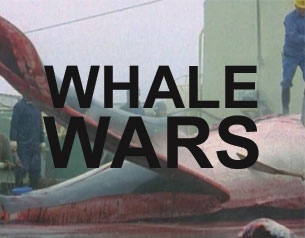Whale Wars
Japan has long been accused of vote-buying and bribery at the International Whaling Commission. We ask how they have got away with it.
 Japan has long been accused of vote-buying and bribery at the International Whaling Commission. Already, through exploiting the loophole of 'scientific research', it has dramatically increased the number and species of whales it kills. Now, it wants to overturn the decades long ban on commercial whaling. Our offering this week uncovers just how it intends to do so. Made for ABC 4 Corners, it also reveals how the farcical rules of the IWC are open to manipulation and abuse.
Japan has long been accused of vote-buying and bribery at the International Whaling Commission. Already, through exploiting the loophole of 'scientific research', it has dramatically increased the number and species of whales it kills. Now, it wants to overturn the decades long ban on commercial whaling. Our offering this week uncovers just how it intends to do so. Made for ABC 4 Corners, it also reveals how the farcical rules of the IWC are open to manipulation and abuse.
It's the whale watching season and the chase is on. To the delight of tourists, they glide past the boat on their way to breed in the Pacific. "They're really amazing. I've never seen whales up that close before", gushes one woman. Since the end of full-scale whaling, numbers of humpback whales have recovered from a few hundred to tens of thousands. But the fate of all whales is in the hands of the International Whaling Commission.
"The tactics used at the whaling commission are quite scandalous", claims Australian delegate Nicola Benyon. "It does get very dirty and aggressive." The IWC controversial rules give all countries the same voting power and allow any delegates to move to change the agenda whenever they want to. Meetings often descend into farce with one time-consuming motion after another proposed in an attempt to delay important votes.
Now, Japan stands accused of stacking the IWC with poor nations in need of money in a bid to outnumber the conservationists. According to Dominica's former cabinet minister Atherton Martin, this government was bullied into supporting a return to commercial whaling after Japan threatened to withdraw its aid. "It was that easy for a foreign government to walk into my country and - with the promise of aid - get a cabinet decision overturned."
In the neighbouring island of Grenada, Michael Baptiste - IWC Commissioner from 1997 to 1999 - freely admits that Japan bought his country's vote with aid. "Japan gives assistance to Grenada so that was one of the reasons we would vote that way. You vote based on your common interests." He also claims Japanese pro-whaling individuals paid all his costs. "They would meet you at the airport and hand you money for your expenses."
To the Japanese, a ban on whaling is an attack on their culture and country. "We are told that what we are doing is just barbaric and what we are eating is something wrong", complains Japanese chief negotiator Joji Morishita. "That's why some people see this issue as one of eco-imperialism or even racism."
So far, all attempts to return to commercial whaling have been thwarted. But Japan has warned it's far from beaten. It will be back in greater force next year with more bought votes from small countries. As one Japanese delegates predicts: "the reversal of history, the turning point, is soon to come."
FULL SYNOPSIS
